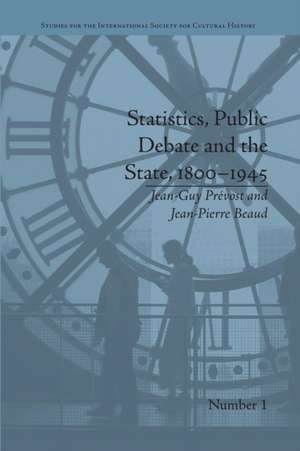Statistics, Public Debate and the State, 1800-1945: A Social, Political and Intellectual History of Numbers: Studies for the International Society for Cultural History
Autor Jean-Guy Prévosten Limba Engleză Paperback – 21 ian 2016
| Toate formatele și edițiile | Preț | Express |
|---|---|---|
| Paperback (1) | 489.26 lei 6-8 săpt. | |
| Taylor & Francis – 21 ian 2016 | 489.26 lei 6-8 săpt. | |
| Hardback (1) | 1110.74 lei 6-8 săpt. | |
| Taylor & Francis – iul 2012 | 1110.74 lei 6-8 săpt. |
Preț: 489.26 lei
Nou
Puncte Express: 734
Preț estimativ în valută:
93.62€ • 97.75$ • 77.48£
93.62€ • 97.75$ • 77.48£
Carte tipărită la comandă
Livrare economică 04-18 aprilie
Preluare comenzi: 021 569.72.76
Specificații
ISBN-13: 9781138661929
ISBN-10: 1138661929
Pagini: 256
Dimensiuni: 156 x 234 x 18 mm
Greutate: 0.45 kg
Ediția:1
Editura: Taylor & Francis
Colecția Routledge
Seria Studies for the International Society for Cultural History
Locul publicării:Oxford, United Kingdom
ISBN-10: 1138661929
Pagini: 256
Dimensiuni: 156 x 234 x 18 mm
Greutate: 0.45 kg
Ediția:1
Editura: Taylor & Francis
Colecția Routledge
Seria Studies for the International Society for Cultural History
Locul publicării:Oxford, United Kingdom
Cuprins
Introduction; Chapter 1 Percentages and the Emergence of Statistical Objectivity; Chapter 2 The Republic of Numbers: Robert Gourlay and the Art of the Statistical Account; Chapter 3 Adolphe Quetelet and the Expanded Reproduction of 'Statistism'; Chapter 4 Form as Content: The Establishment of National Statistical Systems; Chapter 5 Immigration and Population Growth: an American Statistical Controversy; Chapter 6 The Epitaph of Imperial Statistics; Chapter 7 Statistical Expertise and the Twilight of Liberal Italy; Chapter 8 Politics of the Sampling Revolution;
Notă biografică
Jean-Guy Prevost, Jean-Pierre Beaud
Descriere
Based around a number of illustrative case studies, this book charts the development of our modern-day reliance on statistics. Topics covered include scientific innovations, administrative issues and the use of numbers in politics. By looking at these aspects of statistics together, the authors are able to present a truly original work.



































